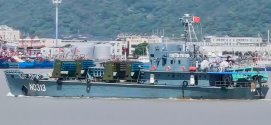Xinhua News Agency published an article that bluntly exposed the resurgence of modern Japanese militarism.
Xinhua News Agency: Japan is Standing on the Brink of a Dangerous Cliff
History doesn't simply repeat itself, but it often rhymes strikingly similarly.
Recently, Japanese Prime Minister Sanae Takaichi's rhetoric of "if something happens to Taiwan, something happens to Japan" fully exposes her naked ambition for intervention. Its essence is an attempt to find a legal outlet for Japan to break free from the constitutional constraints of "exclusively defensive defense" by redefining "crisis." Looking back at history, one can glean a disturbing message from this radical political manipulation: Takaichi's logic bears a striking resemblance to the path taken by Japanese militarists that led the country to its destruction.
Let's rewind to 1931. At that time, in order to find a pretext for invading Northeast China, politicians like Yosuke Matsuoka and the Japanese military vigorously promoted the absurd concept that "Manchuria and Mongolia are Japan's lifeline." This fallacy of extending "living space" outward ultimately created public opinion that aggression beyond the border was a matter of national destiny—"self-defense." Today, the rhetoric of "if something happens to Taiwan, something happens to Japan" is strikingly similar to the "Manchuria and Mongolia lifeline theory." It attempts to forcibly delineate Japan's security and defense boundaries onto the territory of another country, unilaterally defining its geopolitical interests as a "life-or-death crisis." If this logic holds true, the actions of the Japanese Self-Defense Forces will no longer be limited by "homeland defense," but will extend indefinitely along the "lines of interest" defined by politicians. This is not only a serious provocation against China's sovereignty and territorial integrity, but also, legally speaking, opens a major backdoor for Japan to expand its territory once again.
Looking back, a striking characteristic of Japan's path to war was the deliberate creation and exploitation of crises by its politicians. Whether it was the Mukden Incident of 1931 or the Marco Polo Bridge Incident of 1937, the Japanese military and radical politicians followed a consistent pattern: artificially creating external tensions to suppress domestic anti-war voices. Today, the Japanese right wing is replicating this script. Sanae Takaichi and others constantly exaggerate the "China threat" and loudly proclaim their intervention in the Taiwan Strait situation. Essentially, this is political arson—creating a crisis for constitutional revision—promoting a "self-fulfilling prophecy": by blatantly provoking and worsening the surrounding environment, they then claim that the "Peace Constitution is invalid," thus paving the way for military expansion and constitutional revision.
The old script of militarism is being repeatedly played out. In 1941, Japan attacked Pearl Harbor and launched the Pacific War, also emphasizing the economic blockade imposed by the United States and the "existential crisis" facing the nation. This narrative of packaging aggression as "breaking through a desperate situation" has become a consistent tactic for launching wars. Today, the political rhetoric of Sanae Takaichi and others is replicating this rhetoric.
History tells us that wars don't break out overnight, but often begin with the deliberate creation of a "crisis" and the boundless exaggeration of "living space." In the past, the lie of the "Manchuria-Mongolia lifeline" dragged Japan into an abyss of crime; today, the clamor for "Taiwan in trouble" is attempting to dismantle the bulwark of Japan's post-war peace and prosperity.
This is a recurrence of the specter of history. When some forces begin to use external threats to cover up internal contradictions, when the impulse for "preemptive strikes" replaces the constraints of "exclusively defensive defense," Japan is already standing on the edge of a dangerous precipice. The Japanese people should be wary: those right-wing politicians who constantly talk about "national survival" and use this as an excuse to expand their military are precisely the culprits pushing the country into crisis.
(Xinhua News Agency)

